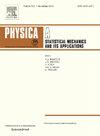从统计物理学角度看分摊费用的公平性:酒吧账单的类比
IF 3.1
3区 物理与天体物理
Q2 PHYSICS, MULTIDISCIPLINARY
Physica A: Statistical Mechanics and its Applications
Pub Date : 2025-10-17
DOI:10.1016/j.physa.2025.131051
引用次数: 0
摘要
在个人消费金额不同的社交环境中,比如共同用餐或酒吧聚会,平均分摊总账单往往会产生令人惊讶的公平结果。在这项工作中,我们开发了一个统计物理框架,通过将个人消费建模为从现实分布中提取的随机变量,特别是伽马分布,来解释这种新兴的公平性。引入类玻尔兹曼加权因子,推导出经济或社会惩罚约束下配分函数、平均消耗、方差和熵的精确解析表达式。利用Marsaglia-Tsang算法进行了数值模拟,证实了分析结果具有较高的精度。我们将典型系综中的个体消耗和理想气体粒子能量直接类比,展示了大数定律、相互补偿和惩罚诱导的有效排序如何结合起来,使相等的成本分担在统计上具有鲁棒性和可预测性。这些发现表明,看似非正式的社会惯例,实际上是建立在控制热力学系统中粒子集体行为的相同基本原则之上的,突出了统计物理学的跨学科力量。本文章由计算机程序翻译,如有差异,请以英文原文为准。
A statistical physics perspective on fairness in shared expenses: The bar bill analogy
In social contexts where individuals consume varying amounts, such as shared meals or bar gatherings, splitting the total bill equally often yields surprisingly fair outcomes. In this work, we develop a statistical physics framework to explain this emergent fairness by modeling individual consumption as stochastic variables drawn from a realistic distribution, specifically the gamma distribution. Introducing a Boltzmann-like weighting factor, we derive exact analytical expressions for the partition function, average consumption, variance, and entropy under economic or social penalization constraints. Numerical simulations, performed using the Marsaglia-Tsang algorithm, confirm the analytical results with high precision. Drawing a direct parallel between individual consumption and ideal gas particle energy in the canonical ensemble, we show how the law of large numbers, mutual compensation, and the effective ordering induced by penalization combine to make equal cost-sharing statistically robust and predictable. These findings reveal that what appears to be an informal social convention is, in fact, grounded in the same fundamental principles that govern the collective behavior of particles in thermodynamic systems, highlighting the interdisciplinary power of statistical physics.
求助全文
通过发布文献求助,成功后即可免费获取论文全文。
去求助
来源期刊
CiteScore
7.20
自引率
9.10%
发文量
852
审稿时长
6.6 months
期刊介绍:
Physica A: Statistical Mechanics and its Applications
Recognized by the European Physical Society
Physica A publishes research in the field of statistical mechanics and its applications.
Statistical mechanics sets out to explain the behaviour of macroscopic systems by studying the statistical properties of their microscopic constituents.
Applications of the techniques of statistical mechanics are widespread, and include: applications to physical systems such as solids, liquids and gases; applications to chemical and biological systems (colloids, interfaces, complex fluids, polymers and biopolymers, cell physics); and other interdisciplinary applications to for instance biological, economical and sociological systems.

 求助内容:
求助内容: 应助结果提醒方式:
应助结果提醒方式:


